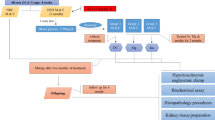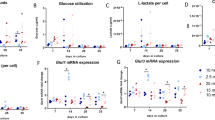Abstract
IT has been shown in a previous paper1 that the ossification process of growing diabetic rats is strongly retarded in comparison with normal animals and that the administration of insulin restores the ossification process to a normal rate. An even more pronounced effect was obtained by daily injections of 1–2 gm./kgm. of glucose-1-phosphate over a period of 10–15 days. The ready response to glucose-1-phosphate suggested that the impairment of ossification in diabetes might be attributed to a possible glucose-1-phosphate deficiency and that this ester might act as phosphate carrier or donor in phosphate deposition in the bones.
This is a preview of subscription content, access via your institution
Access options
Subscribe to this journal
Receive 51 print issues and online access
$199.00 per year
only $3.90 per issue
Buy this article
- Purchase on Springer Link
- Instant access to full article PDF
Prices may be subject to local taxes which are calculated during checkout
Similar content being viewed by others
References
De Bastiani, G., and Petrelli, F., Boll. Soc. Eustachiana dell'Universita di Camerino (in the press).
Author information
Authors and Affiliations
Rights and permissions
About this article
Cite this article
SILIPRANDI, N., DE BASTIANI, G., PETRELLI, F. et al. Action of Glucose-I-Phosphate on the Deposition of Phosphate in the Bones of Growing Diabetic Rats. Nature 180, 1357–1358 (1957). https://doi.org/10.1038/1801357a0
Issue Date:
DOI: https://doi.org/10.1038/1801357a0
Comments
By submitting a comment you agree to abide by our Terms and Community Guidelines. If you find something abusive or that does not comply with our terms or guidelines please flag it as inappropriate.



